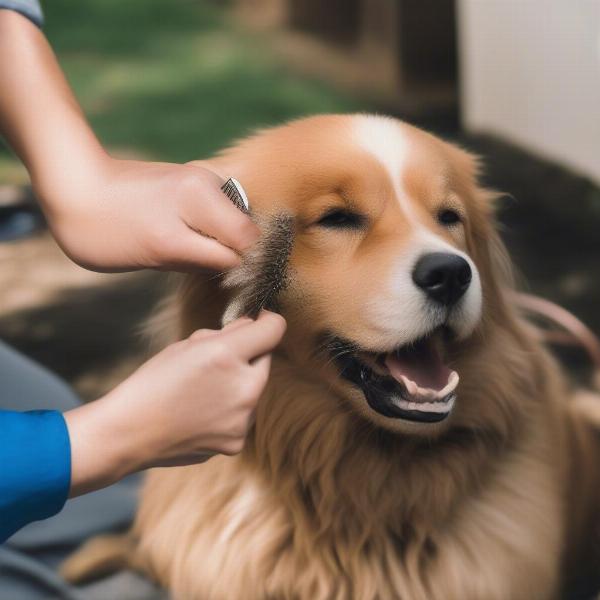Grass seed can pose a hidden danger to our canine companions. While a lush green lawn might seem inviting for playtime, those tiny seeds can become a real nuisance, even leading to serious health issues. Understanding the risks associated with grass seed and how to protect your furry friend is crucial for responsible dog ownership.
Why Grass Seed Can Be Harmful
Those seemingly harmless grass seeds have a sneaky way of getting into trouble. Their sharp, pointed ends allow them to easily burrow into a dog’s fur, paws, ears, and even eyes. Once lodged, these seeds can migrate further into the body, causing infections, abscesses, and significant discomfort. Common signs of a grass seed problem include excessive licking, pawing, head shaking, and redness or swelling in the affected area.
Types of Grass Seed to Watch Out For
While all grass seeds can potentially cause problems, some varieties are more problematic than others. Barley grass and ryegrass seeds, for example, are notorious for their ability to penetrate the skin. Their barbed structure makes removal difficult and increases the risk of infection. Even seemingly harmless lawn grass seed can cause issues if left unchecked.
Protecting Your Dog from Grass Seed
Being proactive is the best approach to preventing grass seed-related problems. Regularly check your dog’s fur, especially after walks in grassy areas. Pay particular attention to the paws, ears, and areas around the eyes. If you have a long-haired dog, consider keeping the fur trimmed short, particularly during grass seed season.
After-Walk Checks and Grooming
A quick check after each walk can make a big difference. Use a fine-toothed comb to remove any clinging seeds.  Chải lông chó để loại bỏ hạt cỏ If you find a seed embedded in the skin, try to gently remove it with tweezers. If you’re unable to remove it easily or if the area appears inflamed, consult your veterinarian.
Chải lông chó để loại bỏ hạt cỏ If you find a seed embedded in the skin, try to gently remove it with tweezers. If you’re unable to remove it easily or if the area appears inflamed, consult your veterinarian.
Choosing Dog-Friendly Grass
If you’re planning on planting a new lawn, opt for grass varieties that are less likely to cause problems. Consider clover lawns, which are soft and less prone to seed development, or choose a grass species with shorter, less barbed seeds. Regular mowing and maintaining a short lawn can also minimize the risk.
What to Do if Your Dog Has a Grass Seed Problem
If you suspect your dog has a grass seed embedded, don’t attempt to remove it yourself if it’s deeply embedded or causing significant discomfort. Seek veterinary attention promptly. Your veterinarian has the tools and expertise to safely remove the seed and address any resulting infections or complications.
Conclusion
While a grassy yard can be a great place for your dog to play, grass seed can be a hidden danger. By understanding the risks and taking preventative measures, you can ensure your furry friend stays safe and enjoys those outdoor adventures without any unwanted hitchhikers. Regular checks, proper grooming, and choosing dog-friendly grasses are all important steps in protecting your dog from the potential hazards of grass seed.
FAQ
-
What are the common signs of a grass seed problem in dogs? Excessive licking, pawing, head shaking, redness, swelling, and discharge are common signs.
-
Which grass seed types are most problematic for dogs? Barley grass and ryegrass, due to their barbed structure.
-
How can I prevent grass seed issues? Regular grooming, after-walk checks, keeping fur trimmed short, and choosing dog-friendly grass types.
-
What should I do if I find an embedded grass seed? Try to gently remove it with tweezers if it’s superficial. Consult a vet if it’s deeply embedded or the area is inflamed.
-
Are there any dog-friendly grass alternatives? Clover lawns are a good option as they are soft and less prone to seed development.
-
When is grass seed season? Typically spring and summer, but it can vary depending on climate and grass type.
-
Can grass seed cause serious health problems in dogs? Yes, if left untreated, embedded grass seeds can lead to infections, abscesses, and even migrate to other parts of the body.
ILM Dog is your trusted source for comprehensive dog care information. We offer expert advice on dog breeds, health, training, nutrition, grooming, and much more. From puppy care to senior dog needs, we cover all aspects of responsible dog ownership. For professional guidance tailored to your furry friend’s specific needs, contact our team of experts. Email: [email protected], Phone: +44 20-3965-8624. ILM Dog is dedicated to helping you provide the best possible care for your canine companion.